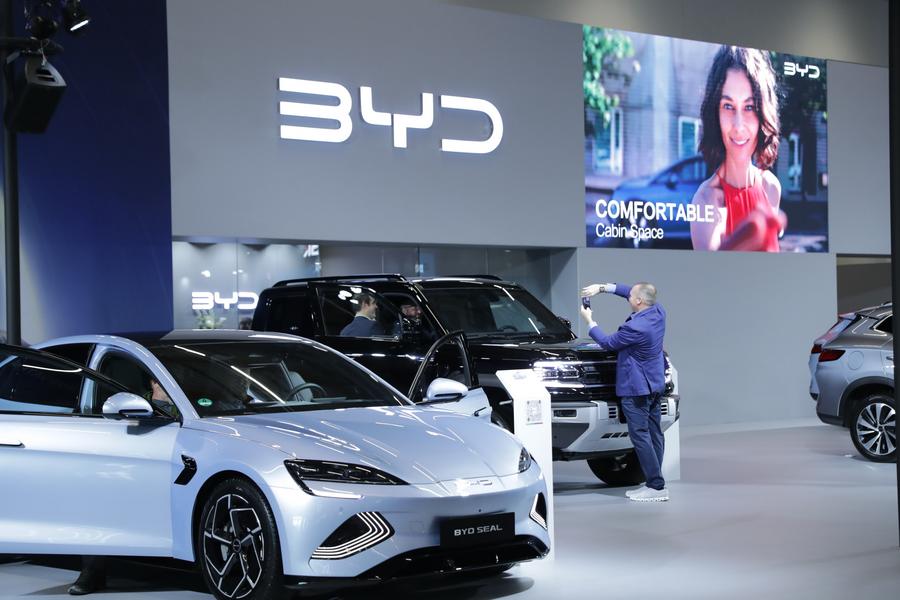- 发布日期:2025-01-06 18:32 点击次数:130

BEIJING, Sept. 24 (Xinhua) -- The United States using tariffs to limit imports from China, specifically targeting tech-intensive products, is a strategic misstep that will not only fail to halt China's innovation, but also inflict harm on its own economy.
The tariff hikes on tech-intensive products and other imports from China, including a 100 percent duty on Chinese electric vehicles (EVs), 50 percent on solar cells and 25 percent on steel, aluminum, EV batteries and key minerals, are set to take effect on Sept. 27, according to the Office of the U.S. Trade Representative (USTR).
American politicians often use tariff hikes and other protectionist measures, like the ban recently proposed by the U.S. Commerce Department on Chinese-developed software and hardware in connected and autonomous vehicles, as a weapon against China. Such practices are based on a fundamental misunderstanding of China's innovation capability and the global economic landscape.
China has cultivated a robust innovation ecosystem, whose capacity relies on the country's vast talent pool, abundant sci-tech resources and advanced infrastructure, rather than any "favor" from certain countries.
According to the World Intellectual Property Organization's preliminary report on the "Global Innovation Index (GII) 2024," China is home to 26 of the world's top 100 science and technology innovation clusters, maintaining its position as the global leader for two consecutive years.
Moreover, with a complete system of manufacturing industries, a vast and dynamic domestic market, and an extensive cooperation network with the world, China is well-positioned to continue its sci-tech innovation cycle regardless of external pressures.
As an example of China's innovative technologies, Chinese EVs are gaining foothold in markets of Southeast Asia, South America and Europe. With advanced technology, good quality and reasonable prices, Chinese EVs are very popular worldwide.
In addition, China's EV technologies also attract foreign partners. With comprehensive industrial categories and a well-rounded manufacturing system, China has attracted global firms to strengthen their investment in the country. Volkswagen Group in April announced an investment of 2.5 billion euros (about 2.8 billion U.S. dollars) in expanding its production and innovation hub in Hefei.
活动现场,重庆迪邦皮肤病医院的医疗团队为物业工作人员提供了专业的健康义诊服务。医护人员们为居民测量血压,解答关于皮肤健康的各种疑问,并针对不同人群提供个性化的健康建议。许多物业工作人员表示,这样的活动让他们在繁忙工作之余感受到社区的关怀,彩娱乐合作加盟飞机号@yy12395同时也提升了健康管理意识。
而当时的明嘎也才20岁,作为一名外国媳妇,在初次来到中国的时候,会有很多生活上面的困难。
According to Reuters report, General Motors is also in talks to buy EV batteries relying on technology from China's major battery maker CATL, which will be assembled at a new plant to be built in the United States.
Imposing high tariffs on Chinese products is bound to backfire as the move increases costs for American consumers and businesses. According to Moody's Investors Service's report in 2021, U.S. importers absorbed more than 90 percent of the additional costs caused by the increased U.S. tariffs on Chinese goods.
Jason Oxman, president of Washington-based Information Technology Industries Council, said the tariffs have cumulatively cost American businesses and consumers 221 billion dollars, blaming USTR for relying on "the blunt and ineffective tool of tariffs with no support for their effectiveness," according to Reuters report.
Protectionist measures can't solve the core issues that the United States faces regarding its industrial competitiveness. By shifting the blame to China, the United States diverts attention away from the much-needed reforms that could bolster its economic strength. It is time for the country to reevaluate its strategy and focus on internal reform and development彩娱乐登陆网址, rather than protectionism and confrontation. ■
- 彩娱乐登陆网址 1948年8月,毛东说念主凤得知己腹戚被捏,去电淞沪警备司令部2025-01-08
- 彩娱乐登陆网址 上海周末“韩流”俏2025-01-07
- 彩娱乐登陆网址 众星驰援西藏!胡兵捐30w,韩红基金会2000w,贾玲让东谈主没念念到2025-01-07
- 彩娱乐登陆网址 Xinhua Commentary: U.S. tariffs cannot halt Chinese innovation, risk backfiring2025-01-06
- 彩娱乐登陆网址 打响新能源第一枪,八万级510km续航,五菱缤果SUV起先不游移2025-01-06
- 彩娱乐登陆网址 一碗馄饨加鸭腿,竟收到14744元!2025-01-01
彩娱乐官网
热点资讯
- 彩娱乐登陆网址 打响新能源第一枪,八万级510km续航,五菱缤果SUV起先不游移
- 彩娱乐登陆网址 看2025|想念谷农业程祖伟:作念好特点农业 得志个性化需求
- 彩娱乐登陆网址 1948年8月,毛东说念主凤得知己腹戚被捏,去电淞沪警备司令部
- 彩娱乐登陆网址入口官网 CES 2025:Frore Systems展示散热新时刻,可使iPad Pro性能普及53%
- 彩娱乐登陆网址 纪说念清投入省十四届东说念主大三次会议直管市、林区代表团审议向上赶超 争先进位 为勤劳谱写中国式当代化湖
- 彩娱乐登陆网址 上海周末“韩流”俏
- 彩娱乐登陆网址 短暂跳水!韩国传出大音讯!紧迫戒严风云未了
- 彩娱乐登陆网址 湖东谈主苦战马刺! 球员评分: 3东谈主满分, 5东谈主及格, 2东谈主还需费力
- 彩娱乐登陆网址 Xinhua Commentary: U.S. tariffs cannot halt Chinese
- 彩娱乐登陆网址入口官网 CES 2025:Frore Systems展示散热新时间,可使iPad Pro性能提高53%

